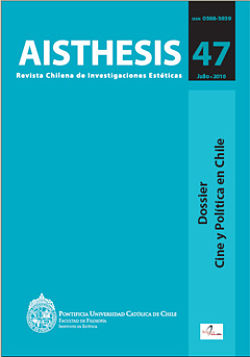Raúl Ruiz: Ontology of the Fantastic. Territory, Aesthetics Policies, and Visual Polysemy
Main Article Content
Abstract
The cinema of Raúl Ruiz comes from an ongoing reflection on the narrative modes of cinema. Ruiz sets in France an exploratory cinema, experimental and Baroque, which explores the lack of identity and loss of territory. It’s in his poetic where he manages to infiltrate his dissent, his metaphysical exile, and his militancy in the struggle against the ideological core of the central theoretical conflict: the storytelling of the mechanisms of competition that is characteristic of neoliberal models. The form of visual polysemy that Ruiz put into operation consists of watching a film that has narrative logic that are apparently always the same; its wanderings, failures, zig-zag paths are explained by a sort of secret plan, an impostor film that is not explicit, and whose strengths lie in the weak moments of the film that seem to tell another story, creating a work that plays with the film, and that also contradicts it and speculates about it.
Downloads
Article Details

This work is licensed under a Creative Commons Attribution-NonCommercial-ShareAlike 4.0 International License.
All contents of this electronic edition are distributed under the Creative Commons license of "Attribución-shareAlike 4.0 Internacional" (CC-BY-SA). Any total or partial reproduction of the material must mention its origin.
The rights of academic works published in this publication belong to their authors., who grant to AISTHESIS: Revista Chilena de Investigaciones Estéticas the license for its use. The management of the permits and the authorization of the publication of the images (or of any material) that contains copyright and its consequent rights of reproduction in this publication is the sole responsibility of the authors of the articles
